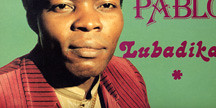
Jamaicans are fond of saying that you don't know who you are 'til your back is against the wall. When the going got tough for American record companies in the late '50s with rock seeming to have run aground — Elvis in the army, Chuck Berry in jail, Buddy Holly and others RIP — the thought occured to someone, probably in Marketing, that Trinidad's calypso might replace it. (It didn't, but my parents insisted on playing Harry Belafonte's Xmas record for years thereafter.) Two decades later, Island Records faced a similar quandry. Aware of Bob Marley's impending demise, that would doubtless stall reggae's commercial momentum, the label cast about for new flavors to entice a jaded pop music audience. Island explored African music, as the eighties began, with two installments of Sound D'Afrique compilations offering an overview of Central and West African dance music. The second volume focused on soukous, a dance music from Congo/Zaire already embraced by African and Parisian tastemakers.
Featured on both volumes of Sound D'Afrique were solo efforts from Pablo Lubadika Porthos. Island later released two 12" singles by the guitarist and singer, one of several Congolese expatriates living in Paris and working as a session player for other African artists (specifically Pamelo Mounk'a) taking advantage of Europe's superior recording facilities.
Island would quickly shift its A&R focus to Nigeria's juju music, the subject of future posts. Outside of Africa, soukous would remain largely a Parisian enthusiasm, as chronicled by Jane Kramer in The New Yorker's pages.
But what of Pablo Lubadika Porthos? Idie, his solo lp produced by the suspiciously named Richard Dick, was released on the Africamania label in the same era as the Island albums. What can be divined about the form and mien of Pablo Porthos' character from this album? There is some ineffable aspect of Pablo Porthos, a complement to the brio of his singing and guitar playing, hinted at in the portraiture that adorns Idie's sleeve. Much can be intuited from the intensity of his gaze: a Congolese kid with massive ambition, a latter-day Horatio Alger with electric guitar in hand storming Paris. Perhaps his natty attire inspires a subtextual reading: the pin-striped velour suit jacket, a gold shirt with Nehru collar, the mad styling of his white patent leather high-heeled boots, the strategically placed multiple karat accessories. Add these visual cues to the flurry of ornaments within a given Pablo guitar solo and his tendency to erupt in broken English ("I love-ah you ver-ry much") when in passion's grip, and there can be but one conclusion: Pamelo Lubadika Porthos was in all likelihood a horn dog of the first order, a transcendental hedonist of admirable scope. As such, he should be added to that roll of inspiring figures whose predilections, professional and personal, are so entwined as should prove instructive to the rest of us: Andre Williams, Baron Corvo, Brian Eno, Stanley Booth, Compay Segundo, Richard Feynman, Russ Meyer, Gesner Henry, Luis Bunuel, Leonard Cohen, Robert Mitchum, Screamin' Jay Hawkins, William Eggleston. I rest my case.
IDIE (@160)
Comments